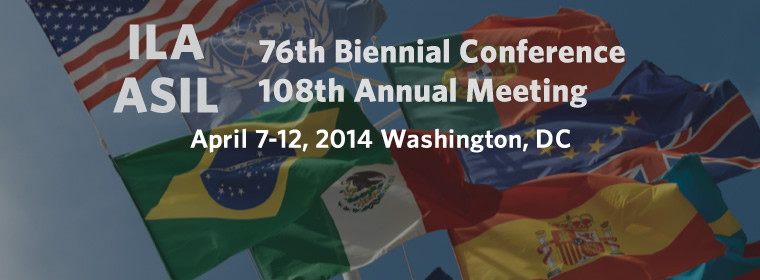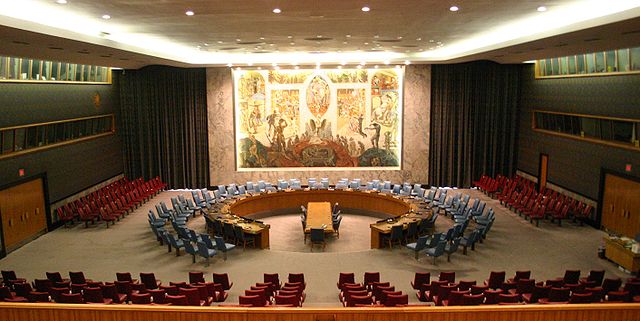This year’s ASIL Annual Meeting will take place from March 30 to April 2, at the Hyatt Regency Capitol Hill in Washington, D.C. The conference theme will focus on ‘Charting New Frontiers in International Law’, and evaluate the shifts that are creating new frontiers in the physical and conceptual structure of our international order.
The post Preparing for the 110th ASIL Annual Meeting appeared first on OUPblog.
It's been another exciting year for international law at Oxford University Press. We have put together some highlights from 2015 to reflect on the developments that have taken place, from scholarly commentary on current events to technology updates and conference discussions.
The post International law at Oxford in 2015 appeared first on OUPblog.
The American Society of International Law’s annual meeting (8 – 11 April 2015) will focus on the theme ‘Adapting to a Rapidly Changing World’. In preparation for this meeting, we have asked some key authors to share their thoughts on the ways in which their specific areas of international law have adapted to our rapidly changing world.
The post International law in a changing world appeared first on OUPblog.

In early April, the American Society of International Law and the International Law Association held a joint conference around the theme “The Effectiveness of International Law.” We may not have been able to do everything on our wishlist, but there are plenty of round-ups to catch up on all the news and events: ASIL Cables posted throughout the conference; the International Law Prof Blog wrote a piece on three female judges of the International Court of Justice (ICJ), who were honored at the conference; IntLawGrrls posted a group photo of all members attending this year’s conference; and DipLawMatic Dialogues blogged from a librarians perspective on the proceedings of ILA-ASIL, including a piece on the Clive Parry Consolidated Treaty Series.
We were delighted to see so many friendly faces. Below is a slideshow featuring some of the authors, editors, and contributors who stopped by to say hello during the week.
-
Sean Murphy
http://blog.oup.com/wp-content/uploads/2014/04/20sq.jpg
Co-author of Litigating War
-
Cesare Romano
http://blog.oup.com/wp-content/uploads/2014/04/19sq.jpg
Editor of the Oxford Handbook of International Adjudication
-
Ruti Teitel
http://blog.oup.com/wp-content/uploads/2014/04/18sq.jpg
Author of Globalizing Transitional Justice
-
Anne Peters
http://blog.oup.com/wp-content/uploads/2014/04/17sq.jpg
Co-Editor of the Oxford Handbook of the History of International Law
-
Ganesh Sitaraman
http://blog.oup.com/wp-content/uploads/2014/04/16sq.jpg
Author of The Counterinsurgent's Constitution
-
Ben Saul
http://blog.oup.com/wp-content/uploads/2014/04/15sq.jpg
Co-author of the International Covenant on Economic, Social and Cultural Rights
-
Salvatore Zappala
http://blog.oup.com/wp-content/uploads/2014/04/14sq.jpg
Editor of Journal of International Criminal Justice
-
Mike Newton
http://blog.oup.com/wp-content/uploads/2014/04/13sq.jpg
Author of Proportionality in International Law
-
David Caron
http://blog.oup.com/wp-content/uploads/2014/04/12sq.jpg
Co-author of the UNCITRAL Arbitration Rules 2nd edition with OUP's very own Merel Alstein
-
Jean d'Aspremont
http://blog.oup.com/wp-content/uploads/2014/04/11sq.jpg
Author of Formalism and the Sources of International Law
-
Pieter Jan Kuijper
http://blog.oup.com/wp-content/uploads/2014/04/10sq.jpg
Co-author of the Law of EU External Relations
-
Duncan Hollis
http://blog.oup.com/wp-content/uploads/2014/04/9sq.jpg
Author of the Oxford Guide to Treaties
-
Won Kidane
http://blog.oup.com/wp-content/uploads/2014/04/8sq.jpg
Co-author of Litigating War: Mass Civil Injury and the Eritrea-Ethiopia Claims Commission
-
Guy S. Goodwin Gill
http://blog.oup.com/wp-content/uploads/2014/04/7sq.jpg
Founding editor of International Journal of Refugee Law, celebrates 25 years since the journal first launched
-
Martins Paparinskis
http://blog.oup.com/wp-content/uploads/2014/04/6sq.jpg
Author of the International Minimum Standard and Fair and Equitable Treatment, stops by the booth between his talks
-
Dieter Fleck
http://blog.oup.com/wp-content/uploads/2014/04/5sq.jpg
Editor of the Handbook of International Humanitarian Law 3rd edition
-
Yuval Shany
http://blog.oup.com/wp-content/uploads/2014/04/4sq.jpg
Author of Assessing the Effectiveness of International Courts
-
Antonios Tzanakopoulos
http://blog.oup.com/wp-content/uploads/2014/04/3sq.jpg
Author of Disobeying the Security Council: Countermeasures against Wrongful Sanctions, and OUP's very own John Louth
-
Jane McAdam
http://blog.oup.com/wp-content/uploads/2014/04/2sq.jpg
Author of Climate Change, Forced Migration, and International Law as well as editor of International Journal of Refugee Law
-
Kai Ambos
http://blog.oup.com/wp-content/uploads/2014/04/1sq.jpg
Author of Treatise on International Criminal Law volumes I and II
Oxford University Press is a leading publisher in international law, including the Max Planck Encyclopedia of Public International Law, latest titles from thought leaders in the field, and a wide range of law journals and online products. We publish original works across key areas of study, from humanitarian to international economic to environmental law, developing outstanding resources to support students, scholars, and practitioners worldwide. For the latest news, commentary, and insights follow the International Law team on Twitter @OUPIntLaw.
Subscribe to the OUPblog via email or RSS.
Subscribe to only law articles on the OUPblog via email or RSS.
Image credit: All photos courtesy of Oxford University Press staff./em>
The post ASIL/ILA 2014 retrospective appeared first on OUPblog.

For the first time in its history, the American Society of International Law (ASIL) is partnering with the American Branch of the International Law Association (ILA) to combine each organization’s major conference into an extraordinary joint event. Oxford University Press is looking forward to exhibiting at the conference taking place in Washington on 7-12 April 2014. The conference theme is “The Effectiveness of International Law,” and no doubt there will be much to debate and discuss during the week. Organizers released a set of questions they hope will be addressed during the course of the conference. To kick off the debate we posed two of them to Ademola Abass, author of Complete International Law.
Are there greater challenges to effectiveness in some areas of international law practice than in others? If so, what are they, and how can they be addressed?
Keen followers of international affairs often wonder why, despite the prohibition on the use of force by the UN Charter, States still resort to this means of addressing international disputes. Explanations vary. Legal experts offer various technical explanations for this development. This includes that the rules governing the use of force are outdated and do not offer enough protection for States. Non-lawyers blame the ‘double-standard’ of international law which allows rich and powerful States to act with impunity while weak and poor States are held accountable for their conducts. Others blame the special status accorded to the five permanent members of the Security Council by the veto vote. Regardless of divergent viewpoints, all agree the prohibition of the use of force is less effective than other areas of international law. This is due principally to lack of compliance by some States, and lack of enforcement against rich and powerful States. It is also difficult for States not to defend themselves against threatening States until those have attacked them. The presence of nuclear weapons makes it difficult for most States to sit and wait for an attack before they respond. Overcoming these challenges requires making the Security Council work more evenly and responsibly; ensuring greater transparency and consistency in the administration of collective security by the United Nations. More importantly, it requires the interpretation of the law prohibiting the use of force in accordance with the reality of the twenty first century.

Do the challenges facing international law vary in different parts of the world, and, if so, how might those challenges be met?
It is often argued that international law began in the West. While one can contest whether it is possible (or purposeful) to seek locating the birthplace of international law, in contradistinction from its development, not many will argue that international law faces severe challenges in the developing world in contrast to the developed world. In the developing world, the first problem of international law is lack of its popularity. This arises through a combination of lack of awareness, of most law students, about the utility and relevance of international law to their societies. Secondly, the marketing of international institution and materials, has almost a Western bias: international institutions such as the United Nations, the International Court of Justice, the International Criminal Court (ICC), World Bank, are all located in the West. Most international law books report cases and jurisdictions that are preponderant Western as if cases and courts in developing countries make no contribution to international law development.
Addressing these challenges calls for a greater balancing acts in the citing and administration of international institutions; it requires a more even coverage of international law; it necessitates making international law more visible to developing countries, and making their contributions to international law more visible to the world. On their own, developing countries must do more to popularize international law in their academic curricula, expose their judges more greatly to international law, and afford international lawyers from the developing countries more opportunity in the dissemination and practice of international law.
Professor Ademola Abass joined the UNU Institute on Comparative Regional Integration Studies (UNU-CRIS) as a Research Fellow in Peace and Security in 2010. He is also the Head of Peace and Security Programme. He is a former Professor of International Law and Organisation at Brunel University, West London and was educated at the Universities of Lagos, Cambridge, and Nottingham. He holds a Ph.D. in International Law and has previously taught in several British universities. He is the author of Complete International Law.
Oxford University Press is a leading publisher in international law, including the Max Planck Encyclopedia of Public International Law, latest titles from thought leaders in the field, and a wide range of law journals and online products. We publish original works across key areas of study, from humanitarian to international economic to environmental law, developing outstanding resources to support students, scholars, and practitioners worldwide. For the latest news, commentary, and insights follow the International Law team on Twitter @OUPIntLaw.
Subscribe to the OUPblog via email or RSS.
Subscribe to only law articles on the OUPblog via email or RSS.
Image credit: The United Nations Security Council Chamber in New York. Photo by Patrick Gruban, 2006. CC-BY-SA-2.0 via Wikimedia Commons.
The post Challenges to the effectiveness of international law appeared first on OUPblog.





